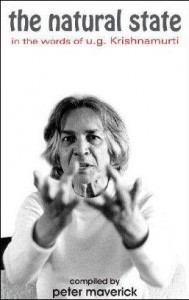 The Natural State ia an anthology of U.G.’s conversations, taken from many sources. It offers some of the most startling and penetrating of U.G.’s words in short, easy to read paragraphs. The selections link together various statements of U.G.’s in a way that creates a sense of cohesiveness. The overall effect of the book can stun the reader into a recognition of the futility of many of his deepest-held convictions about life.
The Natural State ia an anthology of U.G.’s conversations, taken from many sources. It offers some of the most startling and penetrating of U.G.’s words in short, easy to read paragraphs. The selections link together various statements of U.G.’s in a way that creates a sense of cohesiveness. The overall effect of the book can stun the reader into a recognition of the futility of many of his deepest-held convictions about life.
“There is no individual there at all. Culture, society or whatever you want to call it has created you and me for the sole purpose of maintaining its own continuity but at the same time we are made to believe that you have to become an individual. These two things have created this neurotic situation for us. There is no such thing as an individual and there is no such thing as freedom of action. I am not talking of a fatalistic philosophy or any such thing. It is this fact that is frustrating us.” U. G. Krishnamurti.
Download the book here (109 pages/900Kb):
 The Natural State U G Krishnamurti
The Natural State U G Krishnamurti
What are the main teachings of U. G. Krishnamurti?
Uppaluri Gopala Krishnamurti, commonly known as U.G. Krishnamurti, was an Indian philosopher and speaker who rejected the traditional spiritual path and offered a unique perspective on human existence. Here are some of the main teachings associated with U.G. Krishnamurti:
- No spiritual authority: U.G. Krishnamurti rejected the idea of spiritual authorities or gurus who claim to have special knowledge or insight. He believed that each individual must find their own way and that no one can lead them on the path to enlightenment.
- No fixed path: According to U.G. Krishnamurti, there is no fixed path to enlightenment. He believed that each person must find their own way and that trying to follow a particular spiritual practice or philosophy only leads to further confusion.
- The mind is the problem: U.G. Krishnamurti believed that the human mind is the source of all our problems and that it is impossible to change the mind or improve it. He suggested that we stop trying to change the mind and instead live in the present moment, without any thought of the past or future.
- There is no self: U.G. Krishnamurti rejected the idea of a separate self or ego. He believed that the self is an illusion and that there is no such thing as an individual consciousness or identity.
- Freedom from thought: U.G. Krishnamurti emphasized the importance of being free from thought. He believed that thinking is the cause of all our suffering and that true freedom can only be found when we are completely free from thought.
- No spiritual seeking: U.G. Krishnamurti rejected the idea of spiritual seeking or the search for enlightenment. He believed that the very idea of seeking implies a separation between the seeker and the sought and that enlightenment can only be found when there is no separation.
Overall, U.G. Krishnamurti’s teachings emphasize the importance of living in the present moment, letting go of the mind and the ego, and finding one’s own way to enlightenment without relying on spiritual authorities or fixed paths.


ug is not just a man he is full of ocean of knowledge
nice very clarity
Peter Hope You Are Well..Thank You For All The Price Guide. Miss You Friend
I LIKE TO WISH HAPPY BIRTHDAY TO PETER MAVERICK.. DILIP FROM PUNE
First of all, a thousand thanks for all the effort, love and attention put into this webpage .. May it all reflect back on you abundantly.
By he way the download link here is not working … ;]
all the best
J